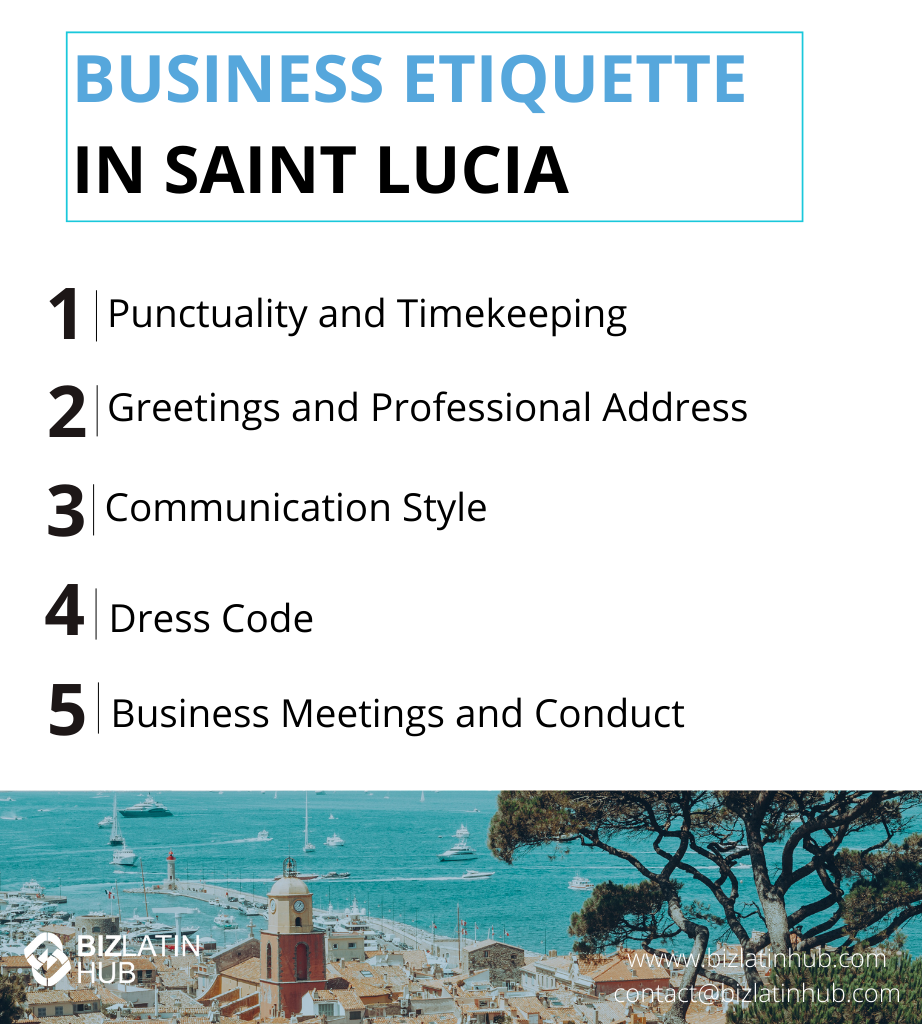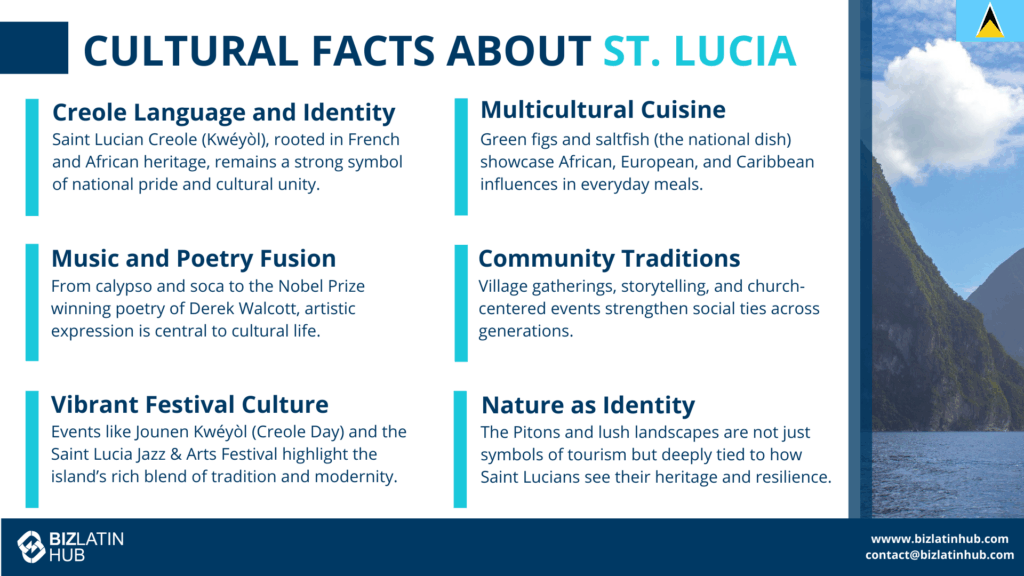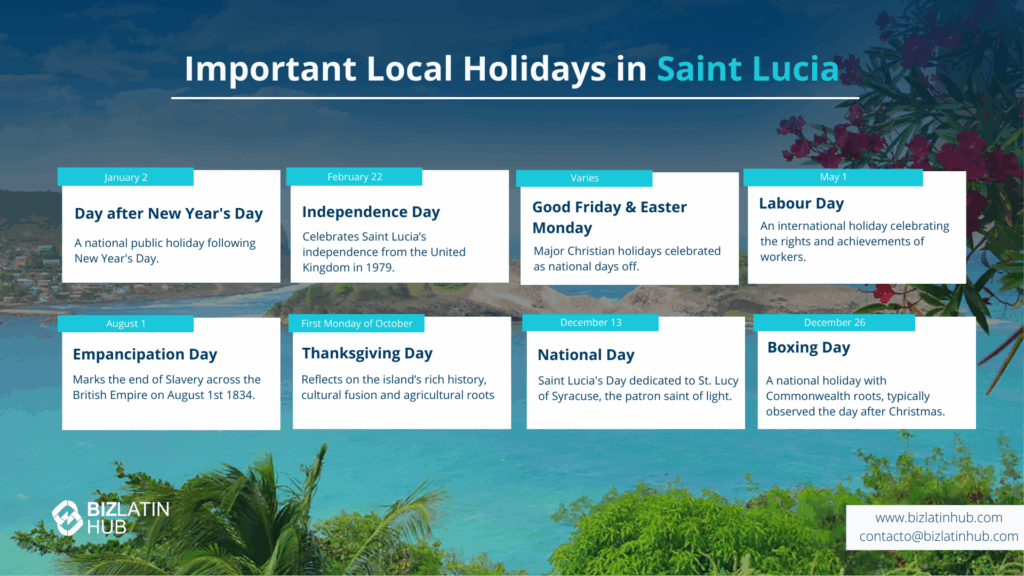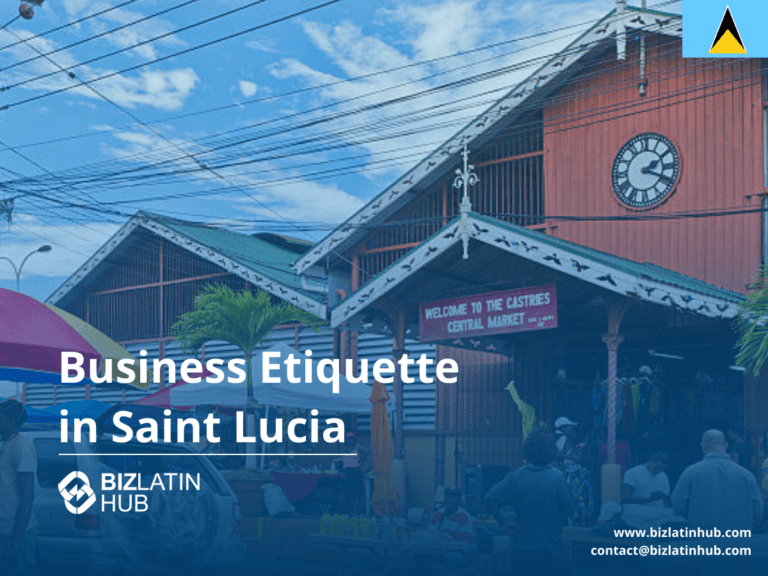Success for business formation in Saint Lucia requires a clear understanding of its business culture. This guide provides essential tips on the island’s unique professional practices to help you build strong business relationships. Saint Lucian business culture values respect and clear communication. Formal business attire is standard for meetings. A relaxed style is appropriate for casual events. Knowing these differences helps build trust with local professionals. This guide provides essential tips on professional conduct, from the importance of punctuality to appropriate communication styles, to help you build successful business relationships.
Key Takeaways: Business Etiquette in Saint Lucia
| Why is punctuality highly regarded in business? | Punctuality is taken very seriously in the professional world and is considered a direct indicator of your reliability and respect for your counterparts’ time. |
| How should you greet people? | Formal titles and surnames should be used in initial introductions. |
| What is the expected standard for business attire? | Formal, for both women and men. |
| How are business meetings typically structured? | The communication style is generally polite and reserved. |
Personal relationships and trust are the foundation of business in Saint Lucia. Professionals build these connections in and out of the office.
Initial meetings often start with friendly conversation before business talk. Exchanging business cards is a common practice. Using last names shows respect. Business deals may take time because they often need approval from several people. A handshake is a serious commitment, similar to a signed contract. Understanding these cultural points is key to success.
Core Business Values
Saint Lucian business operates on core values of respect, trust, and strong relationships.
- Respect: Using titles and last names shows respect.
- Trust: A firm handshake shows a sincere promise.
- Relationships: Strong personal connections are necessary for partnerships.
- Hierarchy: The culture respects a clear organizational structure.
Recognizing these values helps you conduct business effectively.
1. Punctuality and Timekeeping
Punctuality is essential and expected for all business meetings.
Expert Tip: Punctuality as a Sign of Respect
From our experience, while Saint Lucia has a relaxed Caribbean atmosphere in general, this does not extend to business appointments. Punctuality is taken very seriously in the professional world and is considered a direct indicator of your reliability and respect for your counterparts’ time.
Arriving late without a very good reason and a prior phone call can damage your credibility before a meeting even begins. We advise all foreign professionals to make a point of arriving 5-10 minutes early for any scheduled meeting.
2. Greetings and Professional Address
Use a firm handshake and formal titles (Mr., Ms.) with surnames until a more informal relationship is established.
In Saint Lucia, strong personal connections are vital for business success. Professionals often socialize outside of meetings to get to know their partners.
Trust is built through consistent, reliable interactions. Meetings start with small talk to build rapport. Address people by their title and last name at first to show respect. Business lunches are common and often include conversations about family and personal interests. These discussions help strengthen professional bonds.
English is the official language for business. Personal relationships are highly valued. First impressions matter, so formal attire is best for meetings. Business culture in Saint Lucia is a mix of formal British traditions and a relaxed Caribbean style. Punctuality is a sign of professionalism.
3. Communication Style
Communication is generally polite, understated, and respectful. Avoid being overly loud or aggressive in your presentation. In Saint Lucia, business discussions usually start with small talk. This helps build a connection.
Speak clearly and listen actively to show respect. Trust develops from sincere and reliable actions. Meetings require both patience and punctuality to align with the local pace. English is the official language, which helps communication. Following these practices makes business interactions smoother.
4. Dress Code
Opt for lightweight but formal business attire. Avoid overly casual clothing.
Dressing correctly is important for business meetings in Saint Lucia. The style combines British formality with Caribbean comfort. This approach makes a good first impression.
| Occasion | Attire for Men | Attire for Women |
|---|---|---|
| Formal | A lightweight suit (linen or cotton) and a crisp shirt. A tie is optional. Wear closed-toe shoes. | An elegant dress or a skirt and blouse. Choose light, breathable fabrics. Wear closed-toe shoes. |
| Casual | Smart trousers and a collared shirt, or a lightweight suit. A polished look is important. | A professional dress or a skirt and blouse. Light materials are practical and customary. |
This balance of professional and practical clothing shows respect for local norms and the climate.
5. Business Meetings and Conduct
Meetings are typically structured. Begin with polite conversation before moving to business topics. Avoid high-pressure tactics.
Meetings in Saint Lucia mix formality with a relaxed feel. Understanding local customs helps achieve business goals. The environment values punctuality, professionalism, and warmth.
Meeting Protocols
- Punctuality: Arrive on time to show respect.
- Agenda: Prepare and share a clear agenda before the meeting.
- Greeting: Start with a warm welcome and light conversation.
- Follow-up: Send a polite email or make a call after the meeting to maintain momentum.
Meeting Preparation
Arrive on time for all meetings. A prepared agenda provides focus. Dress in conservative business attire. Start with a friendly greeting and casual conversation to align with local customs.
Conduct in Meetings
Punctuality shows respect. Meetings begin with a warm welcome and casual talk on local topics to build trust. A clear agenda guides the discussion. Decision-making can be slow, as it often requires group agreement. Building relationships outside the office can improve trust.
Effective Follow-Up
Following up is crucial for maintaining business relationships. Honor your commitments to build trust. Regular check-ins show you understand your partner’s goals. A handwritten note can leave a strong, positive impression. Celebrating shared successes strengthens professional bonds.

Legal and Business Structures
Saint Lucia provides a clear legal framework for foreign professionals. The government offers various business structures, such as International Business Companies (IBCs) and Limited Liability Companies (LLCs), to suit different investment needs.
Foreign nationals must obtain a work permit through a formal application process. For a detailed guide on company formation and legal requirements, you can explore our full overview of establishing a business in Saint Lucia.
Economic and Political Overview
Saint Lucia is an independent parliamentary democracy and a constitutional monarchy in the Commonwealth. Stable politics are supported by elections every five years. The economy, once based on agriculture, now includes tourism, manufacturing, and global business outsourcing.
The government offers investment-friendly policies, including financial incentives and no capital gains tax. The capital, Castries, is the center of economic activity. The island has many foreign-owned export plants that produce garments, electronics, and paper products.

Investment Opportunities
The government promotes growth in tourism, manufacturing, and business process outsourcing. Financial incentives for investors include no capital gains tax and potential tax breaks for international companies. The business registration process is efficient and can be completed online in about 10 working days.
Tax System
Saint Lucia has a favorable tax system for businesses.
- Capital Gains Tax: None.
- Domestic Corporate Tax: 30% on local profits.
- International Business Companies (IBCs): A 1% tax rate on profits is available.
- Value Added Tax (VAT): 12.5% is the standard rate. The rate for hotels is 7%.
- Other Incentives: Tax and duty exemptions are offered under several acts.
These policies make Saint Lucia an attractive place for investment.
Logistics and Infrastructure
Saint Lucia’s well-developed infrastructure supports international trade. The island has two main sea ports (Port Castries and Port Vieux Fort), a primary international airport (UVF) with global connections, and widely available fiber-optic internet, ensuring reliable business operations.
Living as a Professional in Saint Lucia
Relocating to Saint Lucia offers a unique lifestyle that balances work with a relaxed Caribbean environment. The cost of living is generally lower than in North America or Europe, with varied housing options. The island has both public and private healthcare facilities, and many expatriates choose to secure international health insurance.
Networking Opportunities
Building a strong network in Saint Lucia is key to business success. Understand your partners’ goals to form lasting connections. Follow through on all commitments to build trust. A warm handshake and friendly conversation are standard practice.
Local Business Associations
Joining a local business association offers valuable connections. These groups provide insight into the local market. Active participation can lead to new partnerships.
Industry Events
The annual Jazz Festival is a major event for local businesses. The island also has modern conference facilities for meetings. A stable political climate makes Saint Lucia a good location for industry events. The business registration process is simple, which encourages participation in these events.

Frequently Asked Questions: Saint Lucia Business Etiquette
What are the key business etiquette rules in Saint Lucia?
Key business etiquette in Saint Lucia includes arriving punctually for meetings, dressing in formal business attire, and beginning conversations with polite small talk. Use professional titles and last names when addressing new contacts, such as “Mr. Smith,” to show respect. Building genuine personal relationships is crucial, and a firm handshake indicates seriousness and mutual respect.
How should I greet a business contact?
A firm handshake is the standard greeting for both men and women. Maintain good eye contact. Use formal titles like “Mr.” or “Ms.” along with the person’s surname until you are invited to use first names.
What should I wear to a business meeting?
The dress code is conservative and professional. For men, lightweight dress trousers, a button-down shirt, and sometimes a tie or blazer are appropriate. For women, a business dress, skirt, or smart trousers with a blouse is standard.
Is it okay to schedule meetings on a Friday afternoon?
It is generally best to avoid scheduling important meetings on a Friday afternoon. The work week tends to wind down, and you may find your counterparts are less focused. Mid-morning, from Tuesday to Thursday, is typically the best time for important discussions.
How are decisions made in business?
The business culture tends to be hierarchical. Decisions are often made by the most senior person, though they may consult with their team. The decision-making process can be slower and more deliberative than in some Western cultures.
What official resources can help me start a business?
The main resource for starting a business in Saint Lucia is Invest Saint Lucia, a government agency that supports investors from the initial proposal through to registration and setup. The Saint Lucia Chamber of Commerce, Industry and Agriculture also offers networking opportunities and practical insights into the local business environment.
Biz Latin Hub can help you with business etiquette in Saint Lucia
At Biz Latin Hub, our multilingual team of company formation specialists has extensive experience in supporting foreign executives when starting a business in Latin America. We offer a complete set of services for your business needs, such as legal, accounting, and recruitment support.
You can rely on us as your main contact for entering and doing business in any of the 18 markets in Latin America and the Caribbean where we operate.
Contact us now for personalized assistance or a free quote on company formation in Latin America.
Learn more about our team and expert authors.






